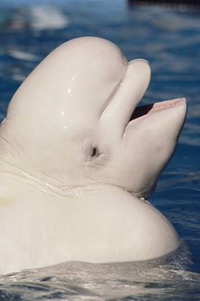Annual hunt for beluga whales is canceled
The Cook Inlet beluga whale rapid and mysterious disappearance has led Alaska Native whalers to agree Monday to cancel their annual hunt for the third time in nine years at the request of the National Marine Fisheries Service.

The fisheries service is expected to decide this week whether to declare the belugas an endangered species.
Scientists once believed that the previously unlimited Native subsistence harvests were to blame for the decline, with an average of 77 whales killed each year between 1995 and 1998. But Cook Inlet belugas continued to die out even after the fisheries service instituted strict hunting limits in 1999, said agency biologist Barbara Mahoney. Since then, a total of five whales have been taken by hunters, who must be Alaska Natives.
Under this year's federal quota, hunters would have been allowed two attempts to shoot adult male whales starting in July after most calves have been born. Baby whales swim near their mothers, making it easier for hunters to differentiate between males and females.
With the hunt canceled, residents of Tyonek, an Athabascan Indian village of 200, who have chased belugas for generations, will need to harvest more salmon, gather more clams and stock up on more store-bought food for the winter. But village council President Peter Merryman, 68, said he has witnessed the thinning of the beluga whale pods for years and has no problems with holding off for another season.
"We understand what's going on. We know the population is declining so we are trying our best to get it back up again," Merryman said. "It's our way to help them out."
Merryman started hunting the whales as a teenager in the 1950s when roughly 2,000 or more belugas lived in the Cook Inlet. The latest estimate by the fisheries service puts the population at 300.
Tyonek is just 43 miles (69 kilometers) southwest of Anchorage but can be reached only by boat or plane. Besides whale, villagers rely for subsistence on foods such as salmon, moose and waterfowl. When a whale is caught, the whole village pitches in to butcher and can the meat and blubber for the winter, Merryman said. The dried meat, or "beluga jerky," dipped in oil from the animals, is a popular snack.
During the summer, hunters usually search for pods at the mouths of rivers, where whales feed on spawning red and silver salmon.
"There's not that many out there like there used to be," said Merryman. "We have to spend more time out there waiting for them to come in."
The population was declared depleted in 2000 under the Marine Mammal Protection Act. Scientists can only guess at the reasons for the whales' scarcity, with pollution and local industry being possible factors, Mahoney said.
The inlet is abuzz with oil and gas drilling, commercial fishing operations and ships carrying most of the state's imports to Anchorage, its most populous city. Pollution sources include storm water and sewage runoff from Anchorage and natural seeps of coal and oil.
"Cook Inlet's a busy place. There could be a number of reasons, but none we can directly state as the cause," said Mahoney, who has studied Cook Inlet belugas since 1991.
She added that predators, including killer whales and possibly sharks, could also be among the reasons for the population decline.
Cook Inlet belugas are one of five genetically and geographically distinct populations living along the perimeter of Alaska. Others are found in the more remote waters of Bristol Bay, the eastern Bering Sea, the eastern Chukchi Sea and the Beaufort Sea, which is north of Alaska and Canada.
The other groups are much healthier, with a total population estimate between 35,000 and 40,000 animals.
Mahoney said scientists hope to collect more information about the whales' reproductive habits, ages and diet, as well as local contaminant and underwater noise levels.
Merryman seems resigned when he talks about the vanishing whales. He said that's because other animals that his people once depended on for food, such as snowshoe hares and even salmon, are also less plentiful than before.
"We always look forward to going out and getting a beluga, but I think Mother Nature takes her course," he said. "Just like everything else, they disappear."
Subscribe to Pravda.Ru Telegram channel, Facebook, RSS!




